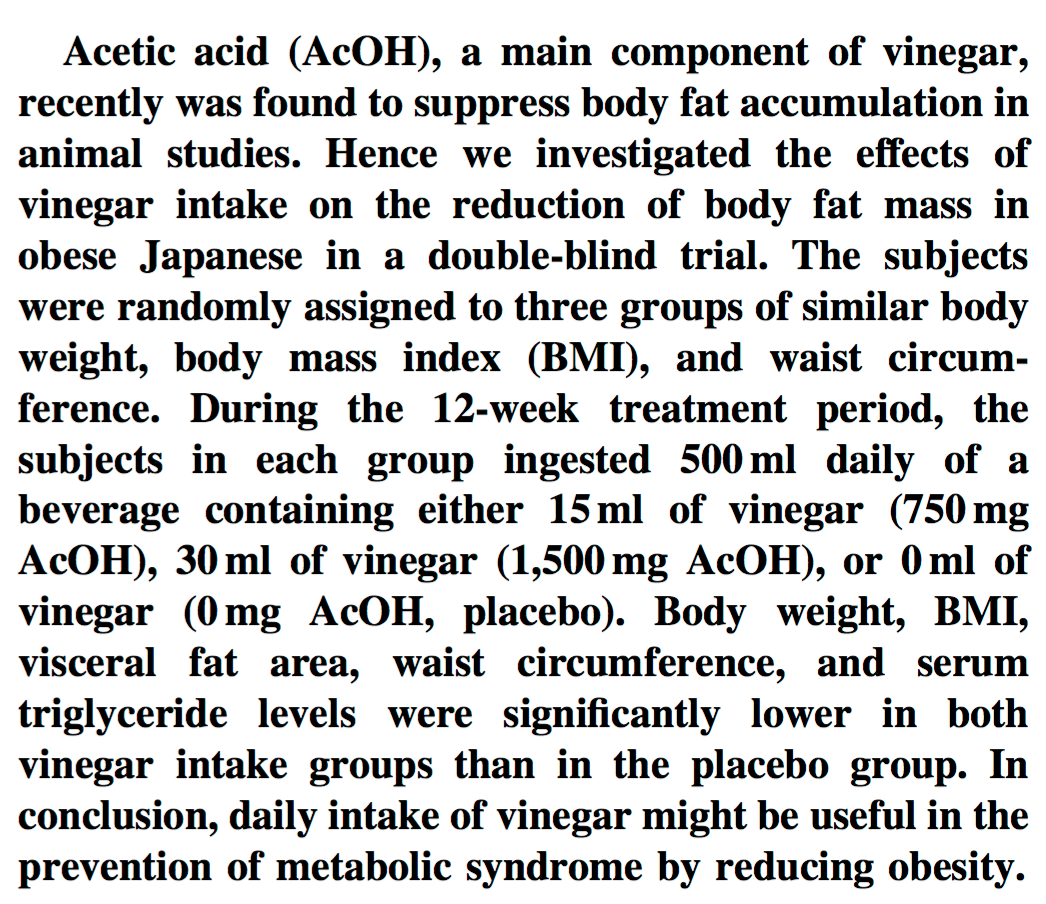
Common New Year’s resolutions are to exercise more, eat healthier and lose weight. One simple trick to help with the latter resolution is apple cider vinegar.
adamkontor / Pixabay
I recently got suckered into one of those Facebook ads promising some weight loss secret. I am always curious about these promotions with secrets how to lose weight without effort promises.
The ad I clicked was a fake CNN story of a student’s research involving apple cider vinegar and garcinia cambogia. Just because it was featured in fake news doesn’t mean that there aren’t any benefits to apple cider vinegar for weight loss and digestion.
Curious about all of the Dr. Oz promised natural weight loss solutions, I did an experiment. I tried 7 natural weight loss supplements, including garcinia camobogia. I found none of them to be a miracle pill to shed a few pounds without effort. I did not try apple cider vinegar.
If you want to try apple cider vinegar for improved digestion and weight loss, it is recommended you drink a teaspoon or two in warm water. Some recommendations say to do so before meals.
Apple Cider Vinegar for Digestion
I’ve struggled with digestion issues my whole life. When I remember to take it, apple cider vinegar seems to help.
One study published by the American chemical Society’s Journal of Agricultural and Food Chemistry found drinking water with vinegar increases good gut bacteria, specifically Lactobacillus and Bifidobacteria, in mice with ulcerative colitis.
Ulcerative colitis is a chronic condition that affects millions of people around the world. Although its cause isn’t completely understood, research suggests that bacteria in the gastrointestinal tract play an important part. People with the condition experience repeated inflammation of the large intestine’s lining, which can cause ulcers, abdominal pain, diarrhea and other symptoms. At least one recent study suggested that vinegar, which has been used in traditional medicine for centuries, might be effective against ulcerative colitis. Lu Yu, Bo Liu and colleagues wanted to further investigate this possibility.
The researchers tested vinegar and its main ingredient, acetic acid, in a mouse model of ulcerative colitis. Giving the mice either substance by adding it in small amounts to their drinking water significantly reduced symptoms of the condition. An analysis of mouse stool samples showed that treated animals had higher levels of bacteria, such as Lactobacillus and Bifidobacteria. ((https://www.acs.org/content/acs/en/pressroom/presspacs/2016/acs-presspac-february-10-2016/vinegar-could-potentially-help-treat-ulcerative-colitis.html))
Another example of how apple cider vinegar improves digestion is by preventing your body from digesting all of the starch in food. This undigested starch then becomes food for the good bacteria in your gut making it a prebiotic. The Washington Post explains:
Carol S. Johnston, associate director of the nutrition program at Arizona State University, who has been studying the effects of vinegar for more than 10 years, says, “Vinegar appears to inhibit the enzymes that help you digest starch.” When starch is not completely digested, you get a smaller blood sugar (glycemic) response — “20-40% less in healthy people and in diabetics” — after eating a high-glycemic food such as a bagel, according to Johnston’s findings. The vinegar has a more moderate blood-glucose impact when a fiber-rich whole grain is eaten (because there is less of a spike to begin with) and no effect when no starch is eaten.
On top of that, undigested starch may have a prebiotic effect, meaning as it passes through the intestines it becomes food for the good bacteria in your gut. Well-fed gut bacteria generally translate to a healthier you because these microorganisms help support good digestion and our immune systems, among other benefits.
Those undigested starch calories may also add up over time to some weight loss…((https://www.washingtonpost.com/lifestyle/wellness/is-apple-cider-vinegar-really-good-for-you/2016/03/21/3f093980-eac7-11e5-bc08-3e03a5b41910_story.html?utm_term=.9049bf62af5d))
Apple Cider Vinegar for Weight Loss
Healthy digestion and weight loss are linked. For example, the undigested starch promoted by apple cider vinegar consumption acts as a prebiotic. Dr. Hyman explains:
Consider resistant starch to be compost or “super-fertilizer” for your healthy gut bacteria or gut microbiome, which profoundly connects to almost every part of your health. In fact, researchers link gut flora imbalances with obesity, diabetes, heart disease, autoimmune disease, inflammatory bowel diseases, cancer, depression, anxiety and autism.
An effective way to get your gut back into balance is tending to your inner garden by giving your gut bugs prebiotics, which they love to munch on. As resistant starch enters your gut, hundreds of species of bugs digest or ferment the starch. From that process, those good bugs create many beneficial compounds.((http://drhyman.com/blog/2016/03/24/the-starch-that-makes-you-lean-and-healthy/))
The scientific studies on apple cider vinegar and weight loss are limited. One small Japanese study found people who drank apple cider vinegar had less belly fat and lower triglycerides. ((http://www.cnn.com/2016/12/22/health/apple-cider-vinegar-benefits/index.html)) Published in 2009, researchers found:
 ((https://www.jstage.jst.go.jp/article/bbb/73/8/73_90231/_pdf))
((https://www.jstage.jst.go.jp/article/bbb/73/8/73_90231/_pdf))
Another study conducted on rats subjected to a high fat diet found apple cider vinegar to be effective for weight loss. Researchers found apple cider vinegar reduced lipid levels. In addition, the mice ate less and loss weight demonstrating the satiating effect of apple cider vinegar consumption.((https://www.ncbi.nlm.nih.gov/pubmed/27209492))
Whether you add apple cider vinegar to your diet for its digestive or weight loss benefits or both, it is a simple, natural, cheap supplement. It is not some magic solution that melts pounds away. That does not exist, nor should you believe any ad that promises such. Simple life style changes like these tips for natural weight loss are most effective.

Leave a Reply